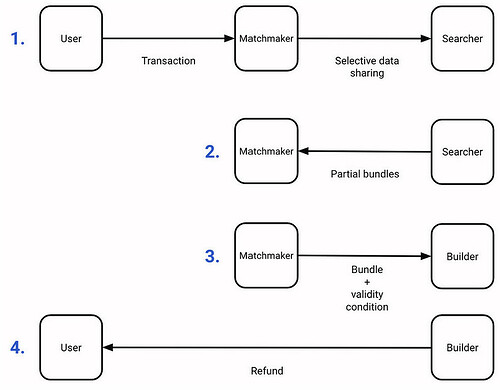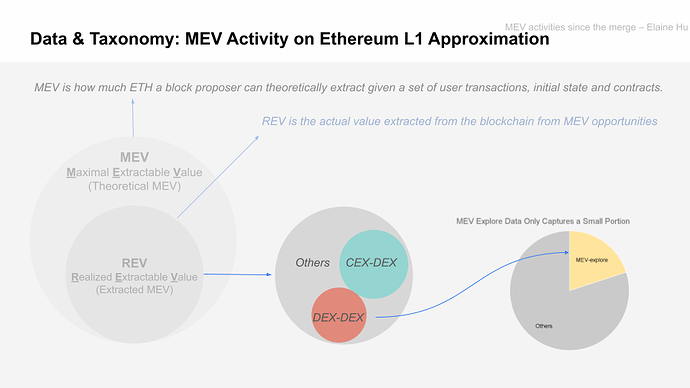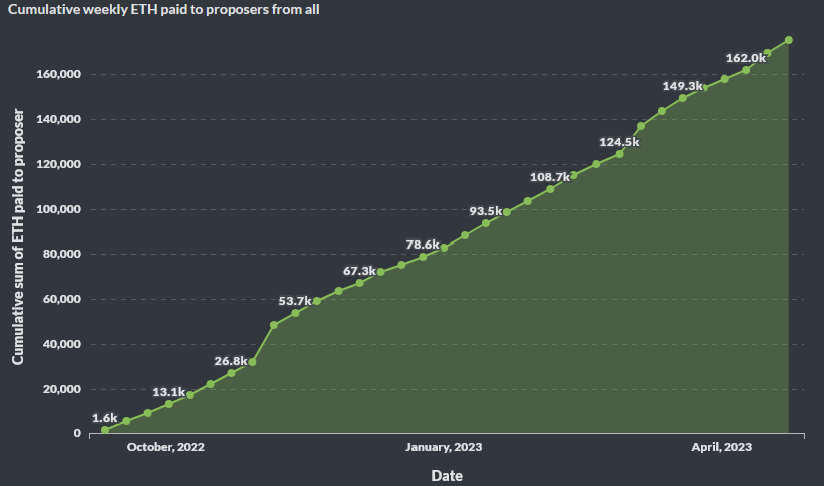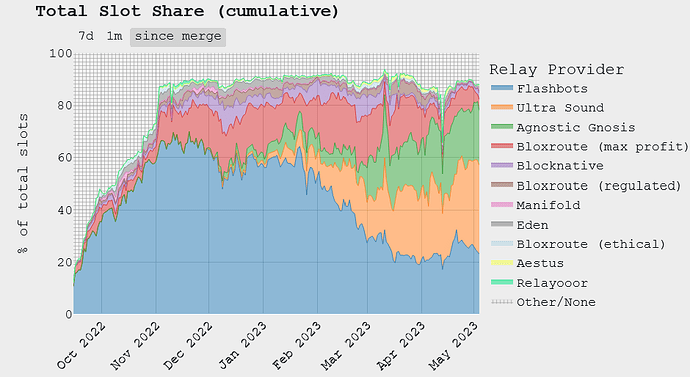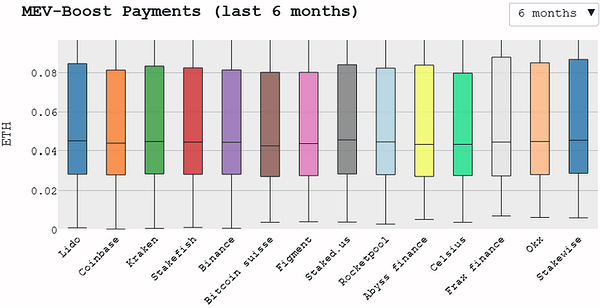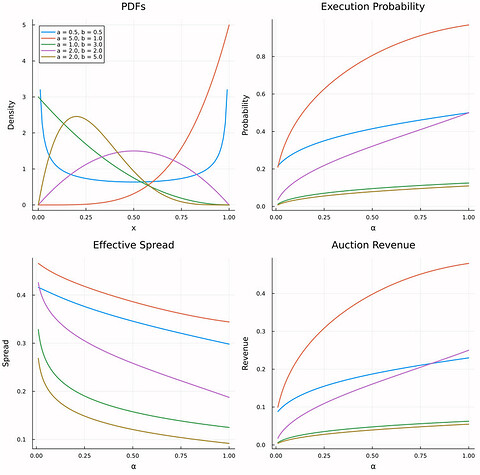Overview
The dark forest of MEV continues to be highly active, with mysterious crusaders ready to strike, and innovative solutions emerging to safeguard users’ privacy and redirect MEV. The past few weeks have been exceptionally vibrant resulting in yet another packed report summarizing developments, research, discussions, and events.
This edition will focus on the launch of MEV-Share, the exploit of an MEV-Boost relay, the Shapella upgrade and our improved Transparency Dashboard. I hope you enjoy!
Announcing MEV-Share beta
An initial release of the MEV-Share protocol has been released! MEV-Share is an important step in decentralizing the orderflow market and redistribute MEV back to users. It provides users the bargaining power to internalize the MEV they create by selectively sharing data about their transactions with searchers, who compete to include them in bundles. In order to mediate this exchange, MEV-Share introduces a new actor called the Matchmaker.
From Announcing MEV-share beta
The Matchmaker is being released as part of an early implementation of MEV-Share, encouraging experimentation and collaboration among users, wallets, dapps, searchers, builders, and other parties in the MEV supply chain. The Flashbots Matchmaker is actively under development and may experience service interruptions or API breaks as we add new features.
We invite actors in the MEV supply chain to join the Decentralized Orderflow Working Group to align community efforts towards research and development for the decentralized future of the MEV supply chain. Additional details can be found in the announcement.
Searching On MEV-Share
To get searchers up to speed on MEV-Share @brock and @shea published a guide exploring the ideas behind the protocol and what’s different compared to MEV-Boost and mev-geth. The post explains the new features of MEV-Share and gives both nstructions and examples of how searchers can access new orderflow and upgrade their strategies.
To begin searching on MEV-Share, you can use Flashbots’ example arbitrage bot to blindly backruns private transactions, or create your own strategies using a client library like matchmaker-ts.
See our updated documentation for information on how to connect as a user, how to get started as a searcher, and how to integrate MEV-Share into your wallet or dapp. Additional details can be found in the threads below going into MEV-Share and simple-blind-arbitrage by @bert, @shea and @brock:
- MEV-Share launch thread by @bert
- MEV-Share launch thread by @shea
- MEV-Share launch thread by @brock
- Thread on simple-blind-arbitrage by @bert
If you are interested in collaborating with us on these research areas, please reach out here, and join the conversation on the MEV-Share protocol here!
Disclosure of metadata inadvertently shared through Protect Status API
On April 27th, Flashbots received a report from Martin Köppelmann that it was possible to view additional metadata (to, from, nonce, gas, and value) on Etherscan about pending transaction hashes shared at mev-share.flashbots.net.
It was not possible to view information on trade details and we have no evidence that Protect users were affected by this issue. The issue was active for one week and was resolved within 73 minutes of the report. We are dedicated to user privacy and trust, and remain committed to addressing incidents quickly and transparently. We appreciate any contributions, responsible disclosures and will make every effort to acknowledge your contributions, see our security policy for more details.
MEV-Boost
MEV-Boost-relay exploit
On April 3rd a vulnerability in the open sourced mev-boost-relay implementation, maintained by Flashbots, was exploited by a malicious proposer to manipulate the ultra sound relay and steal ~$20M from multiple sandwich bots.
The attack was possible due to a bug where the relay would reveal the block body to the proposer regardless of whether the signed block header from the proposer would be accepted by the network or not. With access to the block body the proposer could unbundle sandwiches they had baited searchers to create, and effectively steal their money. And by sending an invalid header to the relay, the proposer ensured that they would win the block equivocation race.
The vulnerability was patched in mev-boost-relay v1.0.0-alpha3 by requiring the relay to first send the block to the network and only release the block to the proposer if that succeeds. A small delay was also introduced to give the relay a head start against any later block a proposer could publish to accumulate the necessary attestations for the fork-choice rule.
A timeline of how the event unfolded and additional details can be found in the post mortem. In the days after the exploit, the network saw an increase in the number of forks.
Increase in forks following the exploit on April 3rd. From Metrika Consensus Performance dashboard
As noticeable in the chart above, the network experienced an increase in the number of missed proposals following Shapella on April 12th. The root cause was identified as an invalid signature bug in the Prysm client, leading to the proposer returning an invalid signature to the MEV-Boost relays which would then reject and not return a block.
A fix to the issue was released in v4.0.2 of Prysm. See the post-mortem from Prysm and Execution Layer Meeting 159 for additional information. @mikeneuder.eth and @metachris published a note, and a forum post with more insights from the relay perspective.
Additional issues in the Prysm client related to the external block builder code path and keymanager were identified shortly after and subsequently patched in v4.0.3.
Disclosure from low carb crusader
On April 21st the actor who executed the unbundling attack on April 3rd reached out and disclosed information about a new block equivocation strategy. Similar to the initial attack this strategy would allow a proposer to receive block bodies from relays and have a structural advantage in the block equivocation race against them. The strategy was never used in production and a patch to mitigate the issue is now live on all relays.
The disclosure also included a request from the attacker to be referred to as “low-carb-crusader”, instead of “sandwich the ripper”, which the address was previously tagged as. Timeline and more specifics on the event can be found in the forum post by @bert.
To ensure a healthy and robust MEV value chain we call on the security, research, and open source communities to join us in hardening MEV-Boost and future enshrined PBS designs.
- Developers: Contribute to mev-boost relay implementations (mev-boost-relay, mev-relay, or Dreamboat) and mev-boost.
- Security researchers: Audit mev-boost relay codebases and mev-boost, as well as contribute to designs for enshrined PBS.
- Researchers: Contribute to medium term research (e.g. the Optimistic Relay roadmap for enshrined PBS) and long term research (PEPC, enshrined PBS).
- Operators: consider running your own mev-boost relay.
- Searchers: study your contracts and be mindful of the MEV they may expose in light of various risks in the MEV marketplace.
- Others: Join MEV-Boost community calls.
Flashbots Transparency Dashboard
The Flashbots Transparency Dashboard has received a significant upgrade with post-merge data on REV (Realized Extractable Value) and a new series of charts. Our methodology has been refined to improve the accuracy of REV estimations; instead of using mev-inspect-py, the dashboard now examines the difference in the block proposer’s balance before and after a block is proposed.
From Will the real MEV please stand up?
We remain committed to providing transparency in the MEV ecosystem and supplying data for research to contributors and collaborators. If you are interested in collaborating on new methodologies or structures to quantify REV, we encourage you to join the conversation!
From Flashbots Transparency Dashboard: Over 175,000 ETH has been paid to proposers since the Merge.
Relay diversification
The diversification of the relay market continues with both Agnostic relay and the ultra sound relay delivering roughly the same number of blocks as the Flashbots relay in recent weeks.
There is still work to be done though and we are committed to foster an open, permissionless, and transparent MEV marketplace through open source, sharing our learnings and engaging in discussions.
Relay diversification since the Merge. From mevboost.pics
As a result of PBS through MEV-Boost, block proposers post-Merge have received the same average block rewards. To ensure credible neutrality and a decentralized validator set on Ethereum, is vital to democratize access to MEV and ensure equal opportunity for all validators without the need for advanced infrastructure or relationships with builders.
MEV-Boost payments to block proposers in the last 6 months. From mevboost.pics
MEV-Boost development
mev-boost relay
Ahead of the Shapella upgrade @metachris and @Shana published guides outlining the MEV-Boost Capella upgrade for relays and recommendations for builders. The Capella-ready v1.0.0-alpha2 release also removed the requirement to run the Flashbots Prysm fork, and uses memcached as fallback for execution payloads.
v1.0.0-alpha3 was released following the exploit on April 3rd to patch the issue of relays not correctly verifying the block header signature before returning the block body.
v1.0.0-alpha4 introduces optional block submission cancellations by allowing block builders to submit blocks with lower value than their last submission.
Prio-load-balancer v0.5.0
A new version of the prio-load balancer has been released, featuring support for SGX proxy nodes that are verifiably inside an SGX enclave. This is yet another open step towards a trustless SGX infrastructure and end-to-end privacy.
Support for Block Building in reth
An issue has been opened in the reth repository by @metachris regarding support for block building and submitting blocks to multiple MEV-Boost relays.
MEV-Boost community calls
MEV-Boost community call #2
This call covered a range of topics, kicking off with Shapella readiness and updates for proposers, builders and relayers using MEV-Boost. The conversation then moved onto a breakdown of optimistic relay going live on ultra sound relay, enshrined PBS and block cancellations.
MEV-Boost community call #3
The conversation in this call covered the unbundling attack on April 3rd and the mainnet Shapella upgrade. The conversation then focused on block cancellations, the optimistic relay roadmap and enshrined PBS through two-slot PBS.
Keep an eye on this forum, and the Flashbots Collective calendar to get notified on upcoming calls!
Research and discussions
[Re]distribution study circle by @guayabyte calls for researchers, developers, activists, and others to explore mechanisms for MEV redistribution. The study club aims to bring people together from diverse backgrounds and disciplines, to share knowledge and experiences, learn from each other, and co-create alternative economic models.
The introductory session is scheduled for May 16th!
Opening Builder/Relay Data by @fiiiu is seeking input from searchers and researchers on whether we should make public the strategies that haven’t landed on-chain, for an extended period of time.
This data has not been shared to protect searchers’ privacy. Considering our commitment to transparency, this is something we want to reconsider and seek community input. If you’re a searcher or researcher, let us know what you think!
A Tale of Two PFOF Models (Paper) by @Eru_Iluvatar compares two PFOF solutions for Flow Providers: batch auction and individual bidding models, aiming to advance the discussion on their mechanisms and effectiveness. The research suggests that individual bidding models provide fairer and higher value for Flow Providers and end users, despite being more complex and potentially adding latency.
Ensuring User Protection and Rollup Revenue with Radius and MEV-Boost by @Tariz from Radius presents an approach to balance user protection against harmful MEV and revenue generation for rollups through a zk-based shared sequencing layer. The solution divides rollup blockspace into two sections, one for regular user transactions with MEV protection and one for revenue-generating activities.
How much should we care about regulation? by @memester explores potential regulatory impacts on MEV and raises questions about the engagement with policymakers to influence policy and protect centralization vectors from potential attacks. The topic raises questions related to how much effort should be spent on engaging with policymakers and which regulatory bodies to focus on.
Flashbots Research Proposals (FRPs)
FRP-28: Contingent Fees in Order Flow Auctions
(Paper)
The work done in FRP-28 by @maxr, with Flashbots contact @quintus, has been published!
“The paper develops a simple model of an order flow auction and compares contingent fees with upfront payments as well as mixtures of the two. Results suggest that auctions with a greater share of the payment contingent on execution have lower execution probability, lower revenue, and increased effective spreads in equilibrium”
From FRP-28 by Max Resnick
FRP-31: A Study of Threshold-Decrypted Mempools, MEV and Their Benefit to Users
In this FRP Antoine Rondelet, with Flashbots contact @quintus, will look at encrypted mempools as a solution to mitigate frontrunning and sandwiching. The research will explore the benefits and drawbacks of threshold-decrypted mempools, their potential impact on users, and compare trade-offs between complete privacy and full transparency in mempool designs.
Flashbots is an open research organization, anyone can submit a research proposal and become eligible for a grant. In order to increase discoverability and highlight the research done in FRPs we’ve recently ported over all FRPs to the new FRP category right here on the forum, check it out!
Events and podcasts
MEVconomics
On March 24th Flashbots, together with ETHGlobal, hosted a one-day summit focusing on the economics of MEV (aka MEVconomics) as part of the annual virtual hackathon - Scaling Ethereum. The event brought together researchers and developers to discuss the latest trends in MEV, distribution mechanisms, and related protocols, building on previous MEV-related events and workshops.
Recordings of the events can be found on Youtube, with transcripts by Zhixiong Pan uploaded to IPFS (including translations to Chinese)! See also Tarun’s intern takeaways of the event, a high-level summary from Grace Deng and Austin King notes on @hasu‘s presentation.
Bell Curve Season 4
The fourth season of the Bell Curve podcast is dedicated to the topic of MEV with @hasu joining as co-host. 6 episodes on MEV have been published so far:
- A Journey into the Dark Forest | Hasu
The premier episode introduces the topics and thesis for the season: the MEV value chain, the modular stack, OFAs, how MEV affects security, the role of latency, fair ordering, FCFS, and more. - Shining A Light On MEV | Tarun Chitra, Justin Drake
In the second episode the hosts are joined by Tarun Chitra and Justin Drake to discuss value accrual in the MEV value chain, MEV auction, fair ordering, latency games and approaches to reduce MEV. - Inside the Economics of MEV | Matt Cutler
Matt Cutler joins the third episode for a discussion on the economics of MEV and dive deep into MEV value capture, OFAs, account abstraction and relayer monetization. - MEV in a Modular World | Jon Charbonneau, Robert Miller
@jon and @bert joins to discuss how Ethereum’s modular roadmap impacts the future of MEV, decentralized sequencer models, cross-domain MEV, latency games, and SUAVE. - Interview with a Searcher 2.0 | Dean Eigenman, Anish Agnihotri
Anish Agnihotri and Dean Eigenmann provide an inside look into the business model of an MEV searcher and explore the intricacies of finding and extracting MEV. - Solana’s MEV Problem | Eugene Chen, Lucas Bruder
Eugene Chen and Lucas Bruder join the show to compare Solana’s MEV market to Ethereum’s and delve into the unique MEV challenges on Solana and Jito’s MEV solution.
CryptoXai.wtf
Together with friends of the Pi-Rate Ship in Zuzalu, Flashbots is organizing an event on May 6th on the intersection of cryptographic- & crypto-economic primitives and AI. The event aims to foster in-depth discussions and synergy between the fields, comparing popular alignment approaches and exploring their tradeoffs.
Participants will examine the merits of combining functional decision theory with cryptographic commitments and the interpretability of such commitments for AI coordination. The event will be livestreamed, with recordings and resources shared in the forum thread.
![]() In order to stay up to date on any upcoming events feel free to subscribe to the Flashbots Collective calendar!
In order to stay up to date on any upcoming events feel free to subscribe to the Flashbots Collective calendar!
Resources
Below is a collection of publications, podcasts, dashboards and other resources from the broader community posted since the last report on topics related to MEV, PBS and Flashbots.
Check out the list from previous months for more fantastic resources and please feel free to share additional resources as replies below or in the bookmark-topics!
Papers and Articles
- Battle of the Crypto Bots: Automated Transaction Copying in Decentralized Finance by Mikolaj Barczentewicz (@MikolajBarczentewicz), Alex F. Sarc and Natasha Vasan examines the legal implications of Generalized Profit-Seeking (GPS) bots under US law.
- PROF: Fair Transaction-Ordering in a Profit-Seeking World by Kushal Babel, Yan Ji, Ari Juels, and Mahimna Kelkar introduces protected order flow (PROF) as a solution to reduce MEV extraction’s negative impact on users.
- Equivocation attacks in mev-boost and ePBS by Francesco d’amato & @mikeneuder.eth analyze equivocation attacks and introduce “headlock” as a potential solution to protect the MEV-Boost ecosystem from double-signed headers and transaction unbundling.
- The Definitive Guide to Sequencing by James Prestwich is a explainer on shared sequencing and why they are being built out for optimistic rollups.
- Optimistic relays and where to find them by Ankit Chiplunkar and @mikeneuder.eth discuss shortcomings of the current MEV-Boost relay design and introduce potential improvements.
- Time, slots, and the ordering of events in Ethereum Proof-of-Stake by Georgios Konstantopoulos and @mikeneuder.eth explores the relationship between MEV-Boost and Ethereum’s consensus mechanism and suggests potential improvements and future directions for research.
- Toni Wahrstätter published a thread with notes to add more color to the situation, including a new diagram looking at the timing of successful bids.
- Bid cancellations considered harmful by @mikeneuder.eth, Thomas Thiery and @metachris explore bid cancellations in MEV-Boost and how they can incentivize dishonest behavior from validators.
- Rollups Aren’t Real by @jon provides an overview of the rollup landscape and goes into detail on sequencers, cross-chain atomicity, MEV on L2s, SUAVE and more.
- SUAVE, Anoma, Shared Sequencers, & Super Builders by @jon dives into shared sequencers’ implications for cross-chain transactions, MEV capture, economic allocation challenges, and rollup customization.
- Shared Sequencing: Defragmenting the L2 Rollup Ecosystem by Espresso Systems looks at the benefits of shared sequencing and how it may defragment the L2 ecosystem.
- Artemis: An Open-Source MEV Bot Framework by Frankie introduce Artemis: a framework from Paradigm for writing MEV bots in Rust, designed to be simple, modular, and fast.
- Modular MEV Part 2: Finality, Actors, State of Rollups, DA Layer and Cross-Domain MEV by rain&coffee dives into the modular blockchain stack, OFAs and cross-domain MEV.
- MEV Resilient Ethereum by Davide Crapis looks at the current state of the MEV ecosystem and introduces the general framework of MEV Resiliency.
- EIP-4844 Fee Market Analysis by Davide Crapis explores the relationship, and interaction, between the EIP-4844 and EIP-1559 fee mechanisms, examining historical data and potential improvements to the current setup.
- Optimistic Relays and the MEV-Boost Latency War by Aestus Relay announce their transitioning to an optimistic relay to reduce latency while highlighting trade-offs such as bonded relay-builder relationships and capital requirements for builders.
- An introduction to maximal extractable value on Ethereum by Greg Damalas emphasizes the need for MEV awareness and mitigation strategies to ensure a safer mass adoption.
- 4337 mev supply chain by Dan Marzec gives an overview of how ERC-4337 alters the MEV landscape by creating new mempools and introducing additional actors, like bundlers and paymasters.
- Subverting the total eclipse (of the heart) by Dan Marzec and Louis Thibault looks at the exploit of the MEV-Boost relays as well as what future eclipse attacks may look like and introduce some possible mitigations.
- The NFT MEV Landscape by Alana Levin outlines MEV in the NFT market and gives an overview of improved pricing mechanisms and MEV-aware minting.
- Understanding Credible Optimal Auctions via Blockchains by Emperor dives into the concept of credible auctions, the auction trilemma, and how conducting auctions on-chain can improve their credibility.
- based MEV-Share by @apriori explores the intersection of ERC-4337, MEV-Share, based rollups and builder pre-confirmations
- Defining the Latencies involved in MEV Strategies by Taker compares traditional and on-chain trading and discusses the possible segmentation of latencies that exist on-chain.
- Latency Games: the Good, the Bad, & the Ugly by Uri Klarman discusses the importance of geographic decentralization and the advantages, and disadvantages, of low-latency trading.
- Relays are a Latency Game by Metrika discusses the impact of latency on the relationships between builders, relays, and proposers.
- Mastering DeFi Trading, Block Building, and MEV by Eyal Markovich shares statistics on latency in the MEV-Boost ecosystem, focusing on block bids, block availability, bundle submissions, and RPC inclusion rates.
- Two slots PBS with unconditional payment by terence takes a look at two slots PBS and what it takes to implement it on the networking side.
- Navigating the Dark Forest: Unraveling the Mysteries of the MEV Market Landscape by Ali provides an overview of the MEV ecosystem, categorizing projects into infrastructure, solutions, and applications.
- MEV Maximizing Strategies for Searchers and Traders: Navigating the Potential Impact of the Shanghai Upgrade on LSD by EigenPhi gives an overview of MEV opportunities due to withdrawals being enabled in the Shapella upgrade.
Posts & threads
- samczsun published an overview of the MEV-Boost relay exploit and how it was mitigated.
- BlockSec adds additional details on how the attacker tricked the sandwich-bots.
- Matt Cutler gives an overview of ERC-4337 through a look at the new transaction flow, including alt-mempools and the role of bundlers.
- Martin Köppelmann posted a thread on the success of the Agnostic Relay and the increase in content-agnostic blocks proposed on Ethereum.
- Jim published a thread that provides an overview of the emerging ecosystem of Rollups-as-a-Service providers.
- Fabrizio Romano Genovese looks into the interaction between recursive auctions and commitment devices, which is being researched under FRP-26 & FRP-27.
- Blockworks Research posted a thread on the searcher jaredfromsubway.eth performing sandwich attacks on Uni v2 pools of newly created tokens with over 30,000 transactions in the last week.
- Good published a thread providing a rundown on how the MEV-bot jaredfromsubway.eth is making $1M per day front running trades on meme coins.
- Al N published a thread on vertical integration between searchers and builders and the implications this might have for order flow auctions.
- Shivani posted a thread on how shared sequencer + SUAVE could be a PBS solution for rollups.
- @bert published a thread diving into the details of the record-breaking 619 ETH MEV proposer payments from MEV-Boost on March 20 due to a bot miscalculating trades in illiquid Uniswap v2 pools.
- Grace Deng posted a thread looking into the combination of MEV and Eigenlayer, PEPC for achieving PBS, MEV-boost++ for protocols who want proposers’ commitments and decentralized sequencers for rollups.
Podcasts & Videos
- So a scammer stole your tokens and is running a sweeper bot on your hacked Ethereum account - Part 1 by @scott gives an overview of what a sweeper bot is, how it operates, and how you can recover assets that are left behind after an attack.
- Future-block MEV in Proof of Stake by Torgin Mackinga looks at new types of MEV in PoS Ethereum due to block proposers being known in advance.
- Zero Knowledge E269: Auctions with guests Kshitij Kulkarni, Matheus V. X. Ferreira and Tarun Chitra discuss the history of auctions and use cases within blockchains, such as MEV and NFT auctions.
- Part 1 - Shanghai Debrief w/ Galaxy - What’s next for Ethereum? (Part 2, Part 3) with guests Tim Beiko, Chris Hager and Torran Green was a conversation on the Shapella upgrade, focused on withdrawals, MEV activity, client health and what’s next for Ethereum.
- PEEPanEIP #103: MEV Boost with @ralexstokes gives an overview of MEV, the transaction supply chain, PBS, MEV-Boost and what’s next. (Slides)
- Unchained Podcast E482: Why MEV Will Always Be Controversial with guest Uri Klarman and Justin Drake discuss the current state of MEV and the path forward for making Ethereum more fair for all its economic actors.
- Shared Sequencers in the Modular Stack with guests Josh Bowen and Ben Fisch discuss the role of shared sequencers focusing on censorship resistance, liveness, composability, MEV and value accrual.
- Latency Wars | MEV and the constant fight for lower latency with Chris Meisl explores the battle and emerging strategies for lower latency on web3 and Ethereum.
- MEV From 2022 To 2023: Walk Through the Dark (part 2) hosted by EigenPhi was a conversation on the state of MEV, DEXes, LP profitability and altcoin trading.
- State of the DEX industry, MEV impact and future hosted by EigenPhi discussed the current state of the DEX and MEV industry, including liquidity provider profitability, the impact of aggregators, and more.
- Understanding ERC-4337 | How everything (and nothing) changes hosted by Blocknative discussed the transaction flow changes with account abstraction and how to try it out today.
- The Great High Frequency Debate hosted by Max Resnick was a conversation on the impact of latency for trades and price discovery and how DeFi may compete with CeFi.
- Celestia Spotlight: Shared sequencers and decentralized rollups by default | Josh Bowen, Astria talks about the implications of rollups integrating with shared sequencers.
Other
- Flash Boys 2.0: Frontrunning, Transaction Reordering, and Consensus Instability in Decentralized Exchanges has been awarded the inaugural CBER-Circle Insight Award. The work will be presented by Ari Juels at the 3rd Annual CBER Conference on May 5th at Columbia University.
- MEVblocker is an OFA by CoW Protocol, Beaver Build and Agnostic Relay that prevents frontrunning and returns MEV back to users.
- Zeromev API allows users to get transaction level MEV summary data for the Ethereum blockchain by block or wallet address.
- ROP-5: Ethereum Supply Network Health Framework by the Robust Incentives Group looks to develop a practical framework to monitor the health of the Ethereum network with a focus on MEV analyzing the interactions and behaviors of actors.
- ERC-4337 UserOps Explorer by Blocknative is a blockexplorer for userOperations, monitoring bundle transactions going through the EntryPoint contract.
- Latency who is it good for? by Michael Jordan is a collection of resources on the topic of latency & MEV.
a
Get involved 

At Flashbots, we research and build systems around MEV, and we would love to collaborate with you. We are a distributed organization with the principles of a pirate hacker collective, and we have several open positions. We also issue grants to external researchers doing work aligned with ours, please find out more in our Research repository. Make sure to also look around on our forum and join the conversations!
